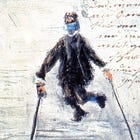Notable Links and Miscellanea - June 26, 2024

Fedorenko, et al. in Nature — Language is primarily a tool for communication rather than thought
“Language is a defining characteristic of our species, but the function, or functions, that it serves has been debated for centuries. Here we bring recent evidence from neuroscience and allied disciplines to argue that in modern humans, language is a tool for communication, contrary to a prominent view that we use language for thinking. We begin by introducing the brain network that supports linguistic ability in humans. We then review evidence for a double dissociation between language and thought, and discuss several properties of language that suggest that it is optimized for communication. We conclude that although the emergence of language has unquestionably transformed human culture, language does not appear to be a prerequisite for complex thought, including symbolic thought. Instead, language is a powerful tool for the transmission of cultural knowledge; it plausibly co-evolved with our thinking and reasoning capacities, and only reflects, rather than gives rise to, the signature sophistication of human cognition.”
Quanta Magazine — How the Square Root of 2 Became a Number. Useful mathematical concepts, like the number line, can linger for millennia before they are rigorously defined.
“Though the ancient Greeks could establish what √2 was not, they didn’t have a language for explaining what it was… Mathematicians continued to live with that ambiguity. Then, in the mid-1800s, Richard Dedekind, among others, realized that calculus — which had been developed 200 years earlier by Isaac Newton and Gottfried Leibniz — stood on a shaky foundation. A reserved but gifted mathematician who worked slowly and published relatively little, Dedekind was preparing to teach his students about continuous functions when he realized that he couldn’t give a satisfactory explanation of what it meant for a function to be continuous.”
Philip Ball for Quanta Magazine: The New Math of How Large-Scale Order Emerges. The puzzle of emergence asks how regularities emerge on macro scales out of uncountable constituent parts. A new framework has researchers hopeful that a solution is near.
The piece also quotes Erik Hoel and discusses his work on causal emergence:
For Hoel, emergent systems are ones whose macroscale behavior has some immunity to randomness or noise at the microscale. For many complex systems, there’s a good chance you can find coarse-grained, macroscopic descriptions that minimize that noise. “It’s that minimization that lies at the heart of a good notion of emergence,” he said.
McCarthy, et al. in JAMA. Is Myocardial Infarction Overdiagnosed?
“Overdiagnosis as opposed to underdiagnosis may now be the dominant form of MI misdiagnosis.”
(I’m sharing this mainly to highlight how questions of “overdiagnosis” can plague even validated diagnoses with established biomarkers!)
Chris Letheby — How Do Psychedelics Reduce Fear of Death?
“The best available evidence suggests that when psychedelic experiences reduce existential angst and restore a sense of meaning in life, they do so primarily by persuading people of the falsity of a broadly naturalistic worldview…”
A talk by Richard Gipps for the Royal Institute of Philosophy — Who Gets to Call Whom Mad? And With What Right?
See also: my interview with Richard Gipps
Neuron — Special issue on Consciousness



